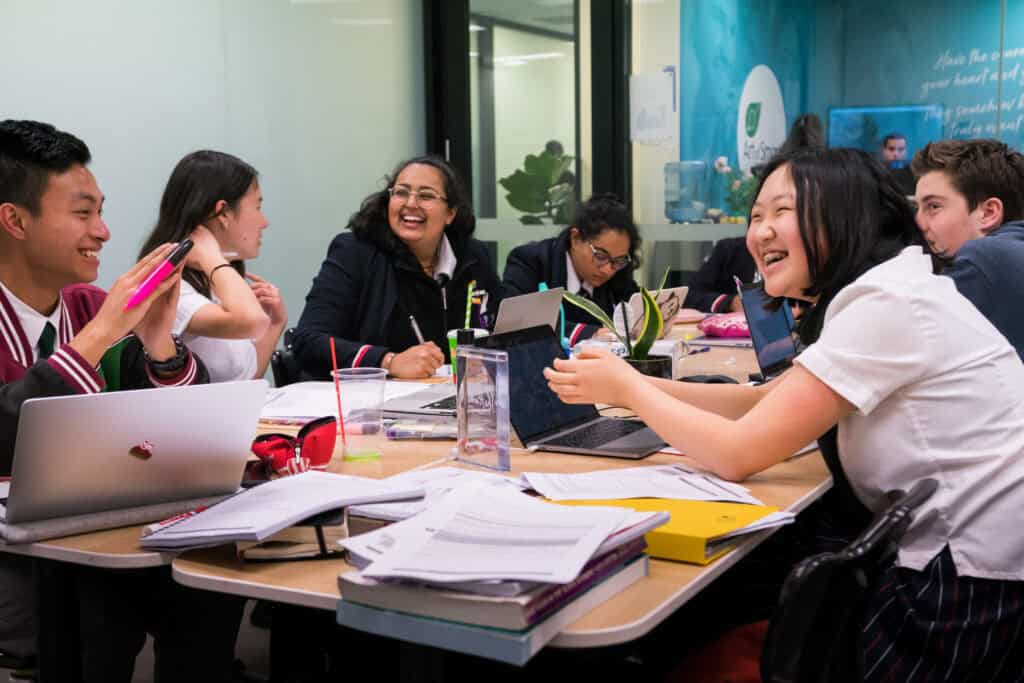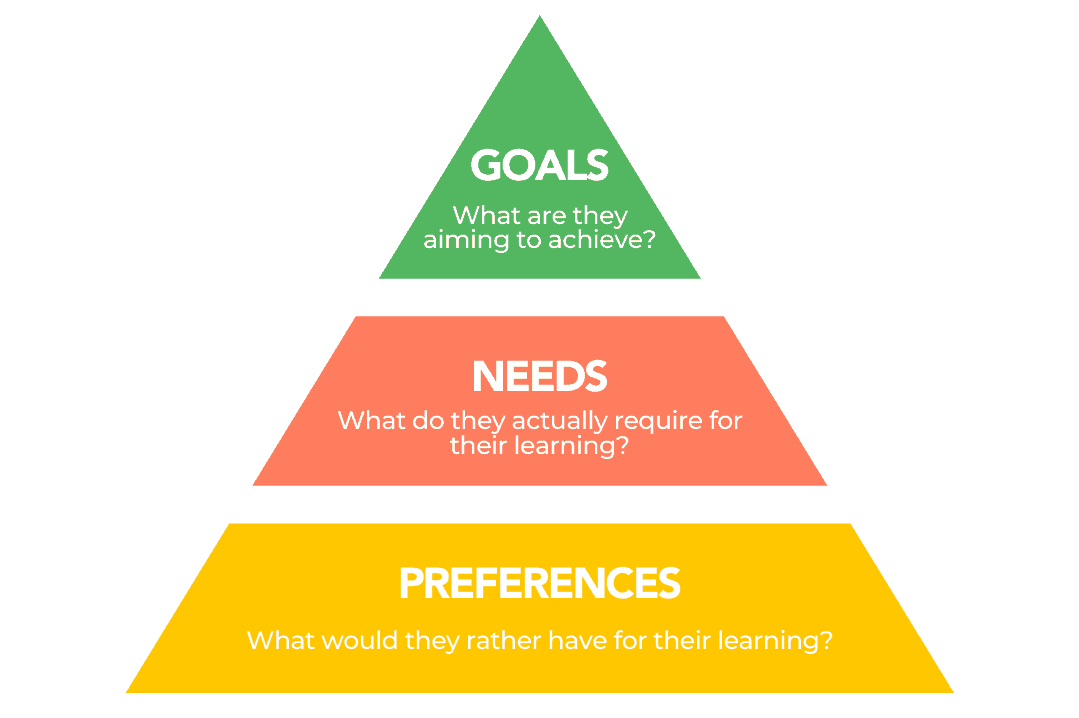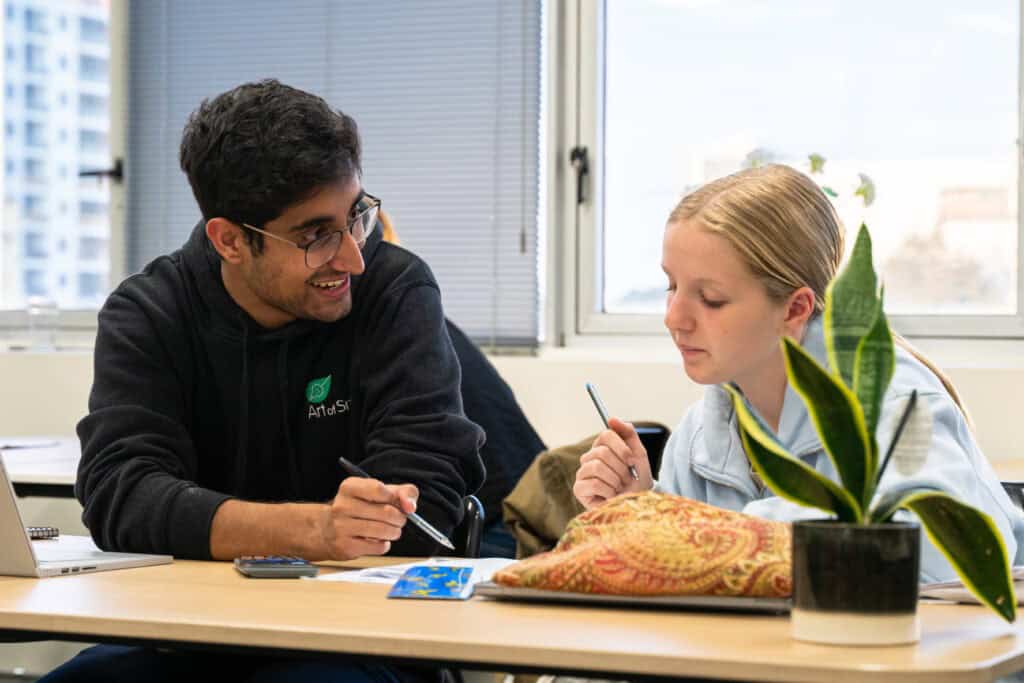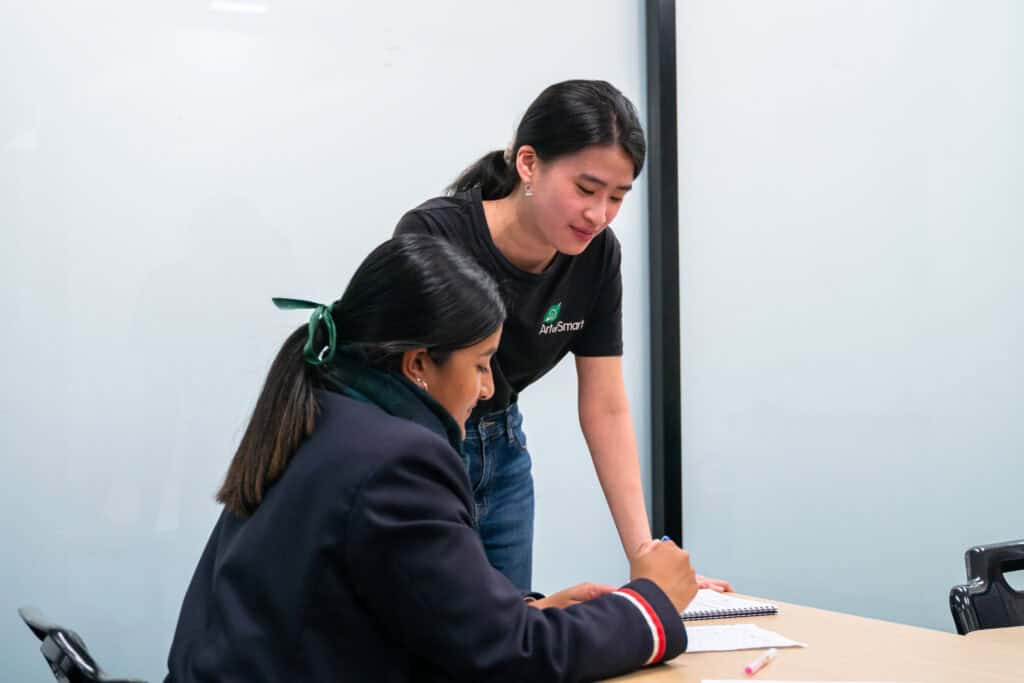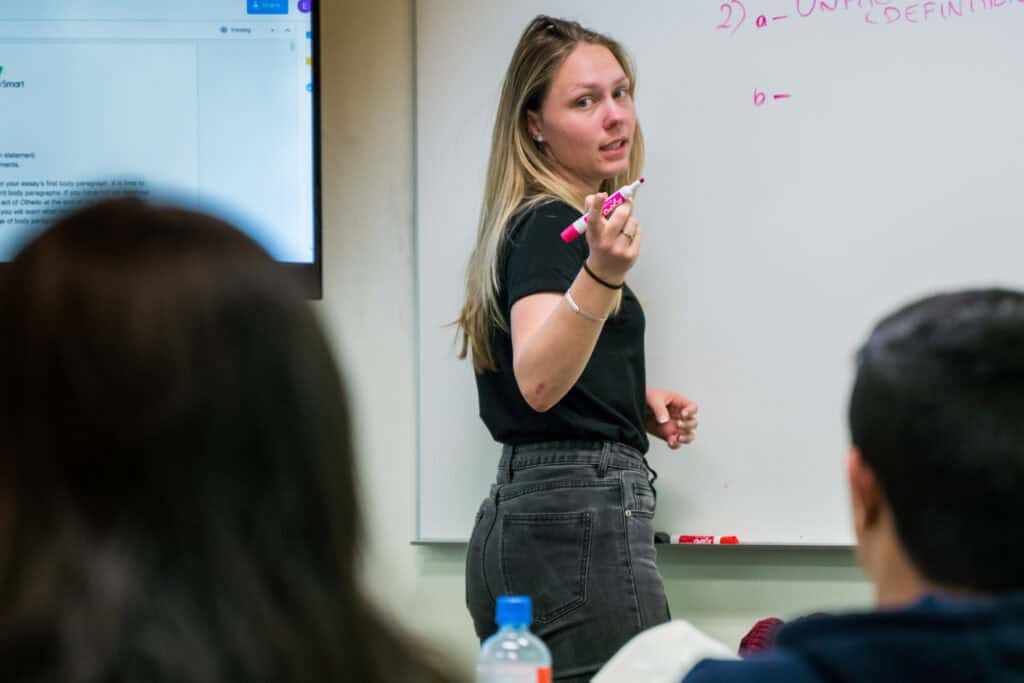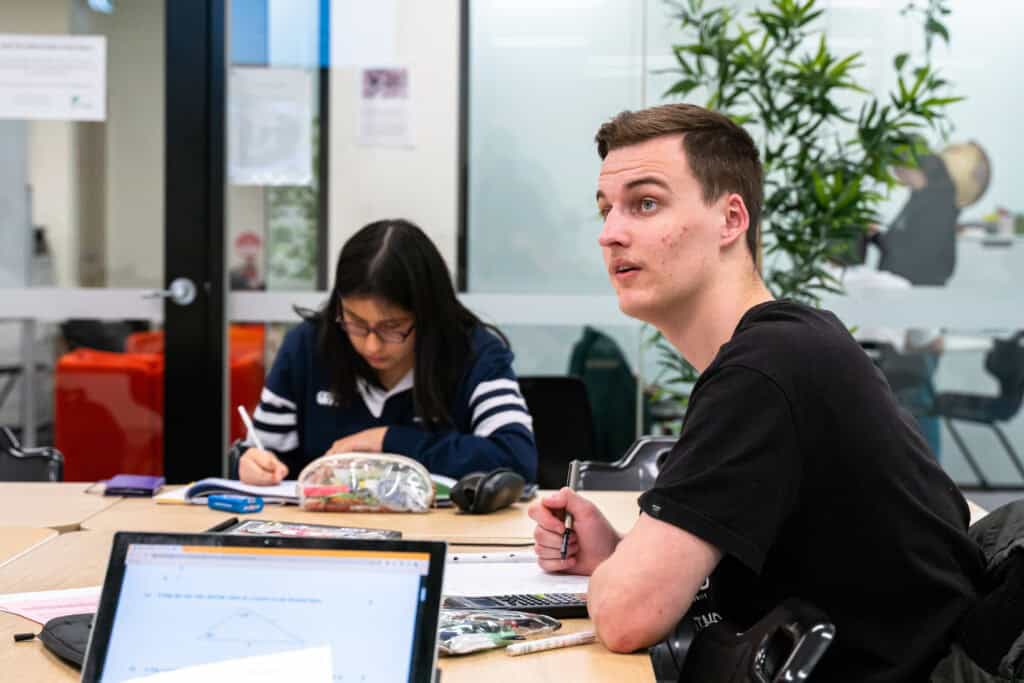So, you’ve decided to get some tutoring for your child but you’re not exactly sure which — one on one or small group tutoring — is the best learning method for them?
Or perhaps, you think you know but might be surprised to find out, there’s another option that suits them better.
We know it can sometimes be challenging to navigate the world of tutoring and working out what’s best for your child. Based on 10 years of supporting over 8,000 students, we’ve identified a framework for matching all kinds of students with the right support!
Keep reading to find out more about this framework and which method of tutoring could work best for your child!
How can you determine which tutoring style is best?
When does one on one tutoring work best?
When do small groups work best?
The Hybrid Approach
How can you determine which tutoring style is best?
Choosing a style of tutoring basically comes down to your child’s learning goals, needs and preferences — but there are obviously different benefits for each of the styles.
Our approach involves seeking to match your child’s learning goals with their needs and some of their preferences.
You might know which kind of tutoring you’re after for your child but perhaps their needs and preferences are suited to a different learning method. That’s why we’re here to help!
To make it easier for you, here’s a list of questions you can ask your child to help find out which learning style will most likely work for them. Of course, every student is different with different learning styles and preferences — so this is more of a guide!
Is one on one tutoring beneficial for your child?
- Are they highly motivated?
- Can they stay focussed on their own during their week to get the work done?
- Do they need some targeted support?
- Are they finding something difficult and need help filling the gaps?
- Are they performing poorly in exams and/or assessments?
- Do they experience anxiety in group settings?
- Are they not comfortable asking questions in group settings?
If they have answered ‘yes’ to a few of these questions, then you’re probably heading in the direction of one to one tutoring — so, check out the section on this below to find out a little more!
Would small group tutoring work for your child?
- Is motivation low, so they need someone to hold them accountable?
- When they get to a hard question, do they end up procrastinating?
- Do they find their exams trickier than the questions they practised?
- Are they choosing to practice the easier questions instead of the hard ones?
- Do they become unmotivated when they can’t answer a question?
- Do they want to be challenged and get ahead of their class at school?
If they have answered ‘yes’ to a few of these questions, then it looks like small classes might be the way to go — check out the section on small group tutoring for some extra details!
When does one on one tutoring work best?
One on one tutoring works really well for students who are highly motivated and/or students who are really struggling and need some help filling in those gaps.
In determining whether your child is highly motivated or really struggling, these are questions to think about:
If your child would rate their motivation levels at a 7 or above, one on one tutoring could be highly beneficial for them.
Now if their marks are sitting at less than 50%, targeted support is essential to get them back on track, and that’s where one on one tutoring comes in.
The benefit of one on one tutoring is that it can really target which support areas to focus on for your child.
With our one on one tutoring, we’ve seen an average mark improvement of 20.7%!
#1: Highly motivated students
Now, one one one tutoring sessions go for 1 hour to 1.5 hours — so your child does have less time with the tutor in comparison to small classes, however if they’re motivated and do the work, that won’t be a problem!
With this dynamic in mind, tutors give students key tasks to work through during the week.
Now, if that motivation isn’t there and the work doesn’t get done, there’s often not enough time in a one to one session, to work over any incomplete tasks.
Students can expect to have really targeted support on a few key areas they need help with — and they’ll get some guidance on the tasks they should prioritise. However, they do need to have the initiative to complete the tasks they’ve been assigned for the next session.
#2: Students who are really struggling
Sometimes school can be really challenging, perhaps your child needs some help filling in those gaps, needs some extra support to get their head around something or want to perform better overall.
One on one can be really helpful in this case because it’s specifically directed at them and what they need to improve.
Additionally, for those really struggling, jumping into a class can be overwhelming since they may have knowledge gaps that haven’t yet been addressed. In order to overcome these knowledge gaps, they need to have a solid foundational understanding of the content being taught.
Now, it gets a little bit trickier because while you need to go back and fill in those knowledge gaps, at the same time, you have to keep moving forward in a class.
Since one on one is more targeted it mainly focusses on filling in the gaps, and there isn’t enough time to move forward.
That’s why, we recommend one on one tutoring for consolidating any knowledge gaps that need to be targeted, and to stay on top of any new content with small classes — we’ll talk more about this hybrid approach further along!
#3: Learning preferences
There are also some cases where a student’s learning preference might mean that one on one works best for them.
Some students really struggle in group dynamics because of anxiety. So, small classes aren’t going to work for them and that’s when one on one is really useful for students experiencing anxiety because it’s just the tutor and them.
Furthermore, some students can feel that they’re not able to ask questions, because they don’t want to look stupid and so that can then get in the way.
In cases like this, one on one would help students feel more comfortable to ask those questions they might be afraid to ask in small classes.
Benefits of One on One Tutoring
If your child identifies with any of the characteristics above, getting one on one tutoring means they can:
- Stay focussed
- Feel comfortable asking their tutor questions
- Fill in any knowledge gaps
- Receive targeted learning
Something to keep in mind is that it’s just your child and the tutor for 1 hour to 1.5 hours! There won’t be any daydreaming out the window or doodling in their textbook, so it’s really time to focus.
This may feel intense for some students, but it’s a way for them to be accountable for their learning. It’s a great way to ensure they’re focussed on the task at hand!
Now that you know all the benefits of one on one, let’s breakdown what small classes are like.
When does small group tutoring work best?
Small group tutoring is really helpful for students who procrastinate, find it difficult to get work done at home, need someone to hold them accountable and challenge them. It’s all about having that extra push and support to help you get ahead and get the work done!
For students who need a bit more help with motivation to be able to push through the difficult questions, then they would be more suited for small group tutoring.
Small groups are structured in a way that students are first taught content to ensure they understand the theory and concepts.
Then, they work on questions that they would probably find difficult to work on by themselves during the week.
Let’s look at Year 10 English small group tutoring as an example:
- 1.5 hours of in-depth English skill-building where you’ll cover how to write an essay, textual analysis, different theories and look at how to approach different questions
- 1 hour of assessment support where you’ll actually work on your essays, can get help from the tutors and extra work to get ahead
Benefits of Small Group Tutoring
#1: Accountability
“If you didn’t have someone there, would you be doing the study for these subjects?” That’s the question we usually ask students (and/or parents) to work out if they should join a small group tutoring session.
It comes as no surprise that the answer to this question is usually “no”. Now, this is where we really start to see the benefit of joining a small group tutoring session because students are held accountable and have time during the session to actually get your work done so it also becomes your study session.
Usually when students work from home, if they aren’t feeling motivated, they may be well intentioned and try to work through questions. However, when they get stuck, procrastination may kick in because they’ve got no one to help them.
Now, that’s why the assessment support which is included as part of the small group tutoring sessions online or at our Hornsby Tutoring Campus and Castle Hill Tutoring Campus is really beneficial.
As your child works through questions, they’ve got a teacher there that when they’re getting stuck — someone to prompt them. The tutor is there to help them so they can truly understand what they are learning.
#2: Encouraged to answer those hard questions
Has your child ever had an exam where the questions were more challenging to answer than all the ones they practised?
What we’ve observed in students is that naturally, as human beings, they like to take the path of least resistance. So, they generally don’t push and attempt the harder questions on their own because they’re difficult and so they just quit.
However, they want to be practising the hard questions so that when it comes to the exam, it’s easier. They walk in feeling confident and prepared!
Now, most students need a little push to do that which is why small group tutoring sessions are great.
With small group tutoring sessions, students are exposed to challenging questions and there’s a tutor encouraging them to tackle hard questions during the class together, since they’re likely to do the work at home.
Students and parents often have this “light bulb” moment when they realise how the small group tutoring sessions challenge and push the students to answer those hard questions they usually wouldn’t. And that’s where the improvement comes from!
#3: Learn from other students
Small group tutoring sessions are a great opportunity to learn from other students’ questions!
The chances are if your child is struggling with a question, there is someone else in the same boat and perhaps they ask about the same question they are struggling with.
So, that’s why being in a small group environment can be really beneficial. Students can learn from the questions that other students ask.
#4: Gives you a good perspective about where you are academically
In a small group setting, you get to gauge where your child is sitting academically in relation to other students.
Since Year 11 and 12 is not just about how your child is going with their peers anymore, it’s a question of how they go in the broader spectrum.
Some students may get a false sense of confidence, or believe that they aren’t doing so well in their school. Or, when they look at where they are actually positioned within their rankings, they discover they’re doing well.
So, these small group tutoring sessions really help put everything into perspective and students will either realise, they need to lift their game because they’ve got a false sense of confidence or it will reduce the overwhelm because they know they’re doing well and need to maintain their marks.
#5: Camaraderie
Being in a small group session with other students allows for great camaraderie in the sense that your child will make friends. It’s a little more social and so there’s an element where learning can be a little more fun because they’ve got a group of people that they’re learning with!
That also means that it’s not as intense as one on one because your child has got other people with them in the session, learning alongside them.
The Hybrid Approach
Well, luckily for you and your child, at Art of Smart, we know that students benefit from a bit of one one one and small group tutoring which is why we’ve combined the two in our tutoring programs.
That means your child is moving forward in the small group session and then in the tutorials and assessment support part of the class, it’s more specific to them and their needs. So there’s the chance to go back and fill in the gaps, get help with your assessments, ask any questions you were afraid to in the group environment and get extra work to help you revise.
The hybrid approach really combines the best of both methods!
With our hybrid method, we’ve seen students improve their marks by an average of 25%!
Combining Small Classes and One on One Tutoring
Often the con of small group tutoring is that they move in a particular sequence and if your child doesn’t understand a topic, they may start to fall behind and feel overwhelmed.
So that’s why we’ve come up with a hybrid approach, where we have the one to ones where when students need them, we include them in to make sure that they’re comprehending the harder content they’re learning.
The tutors are helping your child to consolidate their knowledge, but they’re also able to keep working through harder questions, learning from other students, and all the other benefits of a class.
Something else to keep in mind about this hybrid approach is that our senior small group tutoring programs are structured in a way that students get 3-4 x 1 on 1 tutoring sessions each term!
So, there you go, whether you choose one on one tutoring or small classes depending on what suits your child best, you’re going to see some great results if they work hard!
If you’re looking for the right support for your child, check out the links below!
Looking for some extra support for your child?
We pride ourselves on our inspirational coaches and mentors!
We offer tutoring and mentoring for Years K-12 in a variety of subjects, with personalised lessons conducted one-on-one in your home or at our state of the art campus in Hornsby or the Hills!
To find out more and get started with an inspirational tutor and mentor get in touch today!
Give us a ring on 1300 267 888, email us at [email protected] or check us out on TikTok!
Tanna Nankivell is a Senior Content Writer at Art of Smart Education and is currently in Germany completing a year of study for her double degree in Communications (Journalism) and Bachelor of Arts (International Studies). She has had articles published on Central News – the UTS Journalism Lab and wrote a feature piece for Time Out Sydney during her internship. Tanna has a love for travel and the great outdoors, you’ll either find her on the snowfields or in the ocean, teaching aqua aerobics or creating short films.

